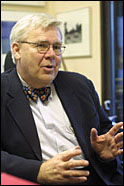Tales from near and far
In his new book, Facsimiles of Time (The Porcupine's Quill), Islamic studies professor Eric Ormsby professes his fascination for "the august witchery of language."
 Islamic studies professor Eric Ormsby
Islamic studies professor Eric OrmsbyPHOTO: Owen Egan |
|
His finely chiselled writings have captured the notice of many critics and publishers over the years for the magic they make of words.
One critic recently observed that Ormsby is the sort of poet who wants us to frequently scurry off to our dictionaries to look up the unusual words he is tossing our way. While Ormsby himself professes that this observation might be taking things a bit far, he rarely settles for an everyday, boring sort of word if he can find a more elaborate and evocative alternative to use in its stead.
"Who wants to use the same old words all the time?" Ormsby asks.
While Ormsby admits he doesn't have much of a profile as a writer within Canada, such august publications as The New Yorker, Paris Review and The New Republic happily publish his poetry. His admirers include the likes of John Updike.
Facsimiles of Time features a number of recent essays Ormsby has produced about poetry and translation, most of which have appeared in The New Criterion. Two of the more intriguing chapters deal with classical Arabic literature.
In an essay that addresses the vitality of the language in much Arabic writing, Ormsby relates, "An Arab poet would have felt dishonoured by writing the sort of parched and minimal verse so in favour among American poets." Some of these writers wielded words in such a powerful way, Ormsby notes, they were often paid to shut up. "There is a rousing tradition of vituperation (hija') of exuberant obscenity. A poet was to be feared and, if possible, bought off by a patron."
Ormsby's insights in this regard are eye-opening. Even well-read Westerners know little to nothing about these writers. Ormsby writes about English novelist Robert Irwin's recent anthology of Arabic literature and offers glimpses of the fascinating real-life characters who produced this work -- ninth-century prose writer al-Jahiz who paid bookshop owners to allow him to be locked up in their stores at night so he could read their stock. Or al-Hajjaj ibn Yusef, a murderous governor who began his career as a grammar school teacher. Or the 'outlaw' poets of the pre-Islamic period and early Islamic period, outcasts from their tribes who glorified their isolation in powerful terms.
Why don't we know more about these colourful writers? "That's been the failure of people like me," says Ormsby. "We just haven't written enough about it."
Any talk connected to Islam these days, of course, brings up the subject of September 11.
"I think that the coverage is a good thing," says Ormsby. "People seem puzzled but also genuinely interested in learning about Islam."
That being said, Ormsby observes that "you'll find characters like the Taliban and Osama bin Laden throughout history and not just in Islam.
"The biggest misconception Westerners have about Islam, in my experience, is that the religion is in some way intrinsically fanatical. This is entirely untrue. If anything, Islam emphasizes reason more than Christianity, for example, does."
That may be so, but Ormsby also notes that some frighteningly effective warriors have emerged from Islam. In a recent essay he produced for The Wall Street Journal, Ormsby recalled the Muslim general Khalid ibn al-Waid who wrote to the Persian emperor in 633 CE, "Submit to our authority... or you will be conquered against your will by men who love death as you love life."
"No doubt the Persian emperor laughed at the letter of the upstart Muslim general, but within 20 years he was driven from this throne and butchered." Ormsby's point -- don't underestimate the determination of the people working with bin Laden today.
Facsimiles of Time also includes reviews of translations. Some of his criticism is scathing. "I've tried to translate, so I know how hard it is. It's such a difficult and thankless task," Ormsby warrants.
Still, given the stakes involved, being the instrument for expressing the thoughts and concerns of one language group to another, it's important to get it right.
"One of the pitfalls [in translation] is a tendency to sacrifice the total effect of the work. You see a lot of word-for-word translations where things are quite accurate at the lexical level but it misses the point of the work overall."
The final chapter in Facsimiles of Time deals with Ormsby's own youth and it delights in its portrayal of how the adults in his family speared one another and those around them with quotes from Shakespeare's works. Ormsby chronicles how he was stunned when he first attended a Shakespearean play as a child and encountered actors "speaking those lines which even then to me had seemed to constitute almost a private, secret family language."
It's a funny moment, but there are also bleak memories of bitter booze-fuelled exchanges between family members who wield Shakespeare's words as weapons.
It's a new sort of writing for Ormsby to engage in. Thankfully he will be doing more of it in the future. One of the projects he is currently working on is a memoir of his life and the youth he spent in the American south.
"The hardest thing about writing is knowing what works and what doesn't," says Ormsby. He is on the right track.

